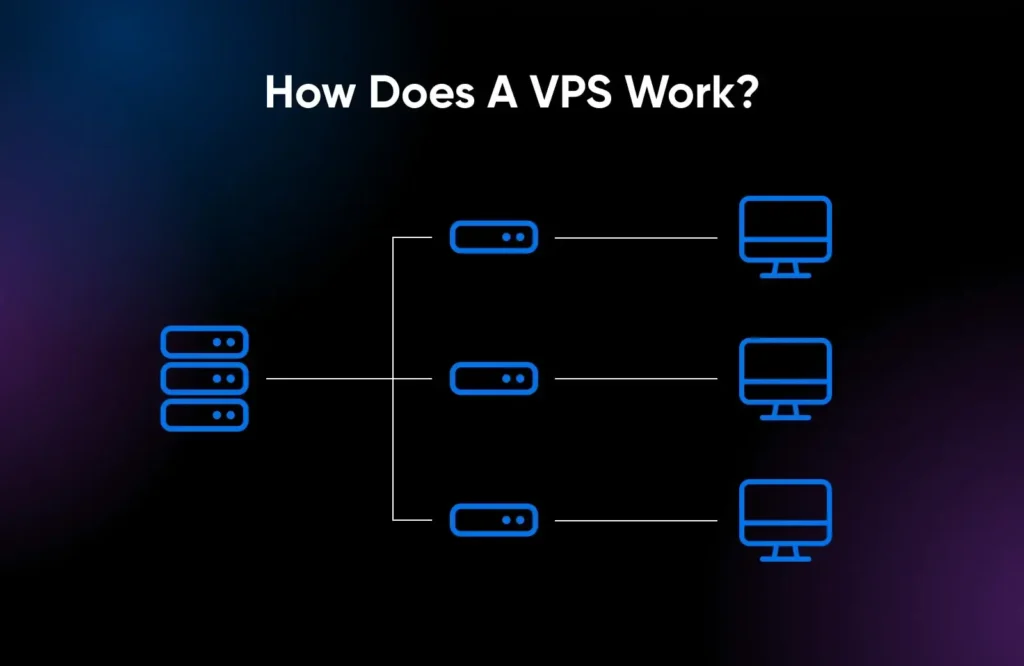
Imagine your website as a car, and hosting is the engine that keeps it running smoothly on the internet’s highways. Like there are various car models, various types of hosting are offered by different companies, each with unique features and benefits. Today, in this article, we will discuss about VPS (Virtual Private Server) Hosting.
VPS Hosting or Virtual Private Server Hosting is considered a more reliable and secure option than shared hosting. It is like an upgrade for websites that have exceeded shared hosting limits but don’t need a dedicated server. It is considered a great option for websites that have medium traffic requirements or websites that process online payments and want to have better security for their data.
What is VPS Hosting?
A Virtual Private Server (VPS) is a hosting service that offers you a dedicated hosting environment using virtualization technology. This means you get exclusive resources on a server shared by multiple users. It’s a powerful solution that ensures enhanced safety and performance for your website or application.
How Does VPS Hosting Work?

Your website’s files and databases are securely stored on a server, which is essentially a computer owned by your web host. When someone visits your website, their browser sends a request to your server, which then uses the internet to transfer the necessary files.
With virtual private server (VPS) hosting, you can have a virtual server that behaves like a physical server, but in reality, it is shared by multiple users. Your hosting company adds a virtual layer on top of the server’s operating system (OS) using virtualization technology like a hypervisor. This layer separates the server, allowing each user to install their own operating system and applications.
Think of it as dividing your computer into two sections so that you can run different operating systems simultaneously, like Windows and Linux. This flexibility allows you to switch between tasks without restarting your computer. And that’s how virtual private servers (VPS) work – they give you your own personal space on a larger computer, so you have the freedom to do what you want.
Setting up your website on a virtual private server (VPS) ensures that you have dedicated resources, such as memory, storage space, and CPU cores, which are not shared with other users. With VPS hosting, you get the same root-level access as dedicated servers but at a much more affordable price.
What are the benefits of using VPS Hosting?
Who Should Use VPS Hosting?
It is best suited for individuals or businesses that have outgrown shared hosting but are not yet ready for a dedicated server. This includes:
(1) E-Commerce Businesses: Online stores that often experience fluctuating traffic, particularly during sales seasons. VPS hosting can handle this surge in traffic while ensuring optimal performance and security for online transactions.
(2) Growth-stage Startups: Startups experiencing rapid growth may require more server resources and customization options, which VPS hosting can efficiently provide.
(3) High-Traffic Blogs: Blogs with large volumes of daily visitors need a robust hosting solution to manage the traffic without compromising on speed and user experience.
(4) SaaS Providers: Companies offering Software as a Service (SaaS) need to ensure reliable service delivery, which calls for stable and scalable hosting solutions that a VPS can provide.
What is managed VPS Hosting?
Managed VPS (Virtual Private Server) hosting is a service where the hosting provider handles the maintenance, updates, and security of a virtual server. This service allows businesses to focus on their core operations, leaving server management to experts.
Advantages
Disadvantages
Managed vs Unmanaged VPS Hosting: Which is Better?
When choosing between Managed and Unmanaged VPS Hosting, the best choice largely depends on your technical skills and resources. Managed VPS Hosting is ideal for those who prefer a hands-off approach, as the hosting provider takes care of all server management tasks such as software updates, security, and system maintenance.
Unmanaged VPS Hosting, on the other hand, is better suited for those with technical expertise who wish to have full control over their server environment and are capable of handling tasks such as system upgrades, installing software, and troubleshooting technical issues.
Frequently Asked Questions
How does VPS Hosting differ from Shared and Dedicated Hosting?
Unlike shared hosting, where you share resources with other users on the same server, VPS hosting allocates a specific portion of the server exclusively for your use. Conversely, while dedicated hosting also provides designated server resources, it is more expensive and demanding to manage, making VPS a balanced middle ground in terms of cost and control.
Is VPS Hosting secure?
Absolutely, VPS hosting is secure. You have your own dedicated portion of the server, and your site won’t be affected by others. Furthermore, most VPS hosts provide robust security features, including custom firewalls and regular malware scans to protect your website.
Can I upgrade my VPS Hosting plan?
Definitely, one of the benefits of VPS hosting is its scalability. As your website grows, you can easily upgrade your hosting plan to accommodate increased traffic and demand.
Do I need technical knowledge to use VPS Hosting?
While a basic understanding of server management can be beneficial, it’s not an absolute necessity. Many service providers offer managed VPS plans where they handle the technical aspects of the server for you.
How Much does a vPS Cost?
A Virtual Private Server (VPS) typically ranges from $20 to $100 per month, with an average cost of $40. The actual pricing may differ based on the hosting provider, the selected plan, and some additional factors.

